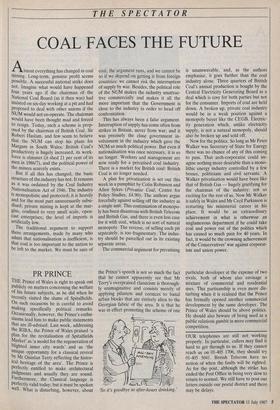THE SPECTATOR
COAL FACES THE FUTURE
But if all this has changed, the basic structure of theindustry has not. It remains as it was ordained by the Coal Industry Nationalisation Act of 1946. The industry IS monopolistic and protected; it is heavily and for the most part unnecessarily subsi- dised; private mining is kept at the mar- gins, confined to very small scale, open- cast enterprises; the level of imports is artificially low.
The traditional argument to support these arrangements, made by many who admit that nationalisation is inefficient, is that coal is too important to the nation to be left to the market. We must be sure of coal, the argument runs, and we cannot be so if we depend on getting it from foreign countries: we cannot risk the interruption of supply by war. Besides, the political role Of the NUM Makes the industry unattrac- tive commercially and makes it all the more important that the Government is close to the industry in order to head off confrontation.
This has always been a false argument. Interruption of supply has come often from strikes in Britain, never from war; and it was precisely the close government in- volvement in the industry which gave the NUM so much political power. But even if nationalisation was once necessary, it is so no longer. Workers and management are now ready for a privatised coal industry. There is a market for British coal: British Coal is nb longer needed.
A plan for privatisation is set out this week in a pamphlet by Cohn Robinson and Allen Sykes (Privatise Coal, Centre for Policy Studies, £4.90): The authors argue forcefully against selling off the industry as a single unit. This continuation of monopo- ly has been disastrous with British Telecom and British Gas, and there is even less case for it with coal, which is no sort of natural monopoly. The reverse, of selling each pit separately, is too fragmentary. The indus- try should be parcelled out in its existing separate areas.
The commercial argument for privatising is unanswerable, and, as the authors emphasise, it goes further than the coal industry alone. Three quarters of British Coal's annual production is bought by the Central Electricity Generating Board in a deal which is cosy for both parties but not for the consumer. Imports of coal are held down. A broken up, private coal industry would be in a weak position against a monopoly buyer like the CEGB. Electric- ity generation which, unlike electricity supply, is not a natural monopoly, should also be broken up and sold off.
Now for the politics. So long as Mr Peter Walker was Secretary of State for Energy there was no chance of any of this coming to pass. That arch-corporatist could im- agine nothing more desirable than a mono- lithic energy industry controlled by a few bosses, politicians and civil servants. A Walker privatisation would have been like that of British Gas — hugely gratifying for the chairman of the industry: not so exciting for the rest of us. Now Mr Walker is safely in Wales and Mr Cecil Parkinson is restarting his ministerial career in his place. It would be an extraordinary achievement in what is Otherwise an unglamorous departmentif he could take coal and power out of the politics which has caused so much pain for 40 years. In fact, it would be the crowning achievement of the Conservatives' war against corporat- ism and union power.


















































 Previous page
Previous page